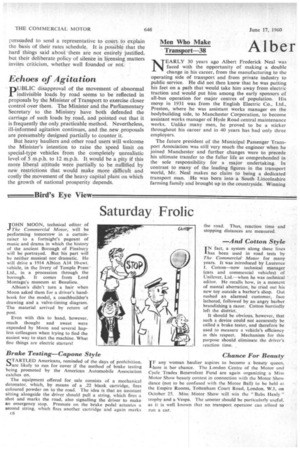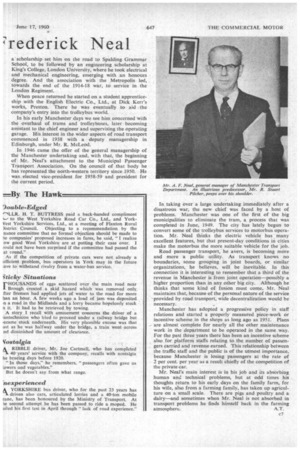Alber
Page 42

Page 43

If you've noticed an error in this article please click here to report it so we can fix it.
7rederick Neal NEARLY 30 years ago Albert Frederick Neal was faced with the opportunity of making a double change in his career, from the manufacturing to the operating side of transport and from private industry to public service. He did not then know that he was putting his feet on a path that would take him away from electric traction and would put him among the early sponsors of all-bus operation for major centres of population. His move in 1931 was from the English Electric Co., Ltd., Preston, where he was assistant works manager on the bodybuilding side, to Manchester Corporation, to become assistant works manager of Hyde Road central maintenance works. Unlike many men, he proved to be a sticker throughout his career and in 40 years has had only three employers.
The future president of the Municipal Passenger Transport Association was still very much the engineer when he joined Manchester and further changes were to precede his ultimate transfer to the fuller life as comprehended in the sole responsibility for a major undertaking. In contrast to many of the leading figures in the transport world, Mr. Neal makes no claim to being a dedicated transport man. He was born into a South Lincolnshire farming family and brought up in the countryside. Winning
ascholarship set him on the road to Spalding Grammar School, to be followed by an engineering scholarship at King's College, London University, where he took electrical and mechanical engineering, emerging with an honours degree. And the association with the Metropolis led, towards the end of the 1914-18 war, to service in the London Regiment.
When peace returned he started on a student apprenticeship with the English Electric Co., Ltd., at Dick Kerr's works, Preston. There he was eventually to aid the company's entry into the trolleybus world.
In his early Manchester days we see him concerned with the overhaul of trams and trolleybuses, later becoming assistant to the chief engineer and supervising the operating garage. His interest in the wider aspects of road transport commenced in 1938 with a deputy managership in Edinburgh, under Mr. R. McLeod.
In 1946 came the offer of the general managership of the Manchester undertaking and, with that, the beginning of Mr. Neal's attachment to the Municipal P,assenger Transport Association. On the council of that body he has represented the north-western territory since 1950. He was elected vice-president for 1958-59 and president for the current period.
In taking over a large undertaking immediately after a disastrous war, the new chief was faced by a host of problems. Manchester was one of the first of the big municipalities to eliminate the tram, a process that was completed in June, 1949. The city has lately begun to convert some of the troIleybus services to motorbus operation. Mr. Neal thinks the electric vehicle has many excellent features, but that present-day conditions in cities make the motorbus the more suitable vehicle for the job.
Road passenger transport, he avers, is becoming more and more a public utility. As transport knows no boundaries, some grouping in joint boards, or similar organizations, he believes, will be inevitable. In this connection it is interesting to remember that a third of the revenue in Manchester is from joint operation—possibly a higher proportion than in any other big city. Although he thinks that some kind of fusion must come, Mr. Neal maintains that, because of the personal nature of the service provided by road transport, wide decentralization would be necessary.
Manchester has adopted a progressive policy in staff relations and started a properly measured piece-work or incentive scheme in the shops as long ago as 1951. Plans are almost complete for nearly all the other maintenance work in the department to be operated in the same way. For the past three years there has been an incentive scheme also for platform staffs relating to the number of passengers carried and revenue earned. This relationship between the traffic staff and the public is of the utmost importance, because Manchester is losing passengers at the rate of 2 per cent, per year as a result chiefly of the competition of the private car.
Mr. Neal's main interest is in his job and its absorbing human and technical problems, but at odd times his thoughts return to his early days on the family farm, for his wife, also from a farming family, has taken up agriculture on a small scale. There are pigs and poultry and a dairy—and sometimes when Mr. Neal is not absorbed in transport problems he finds himself back in the farming atmosphere. AT.
























































































































